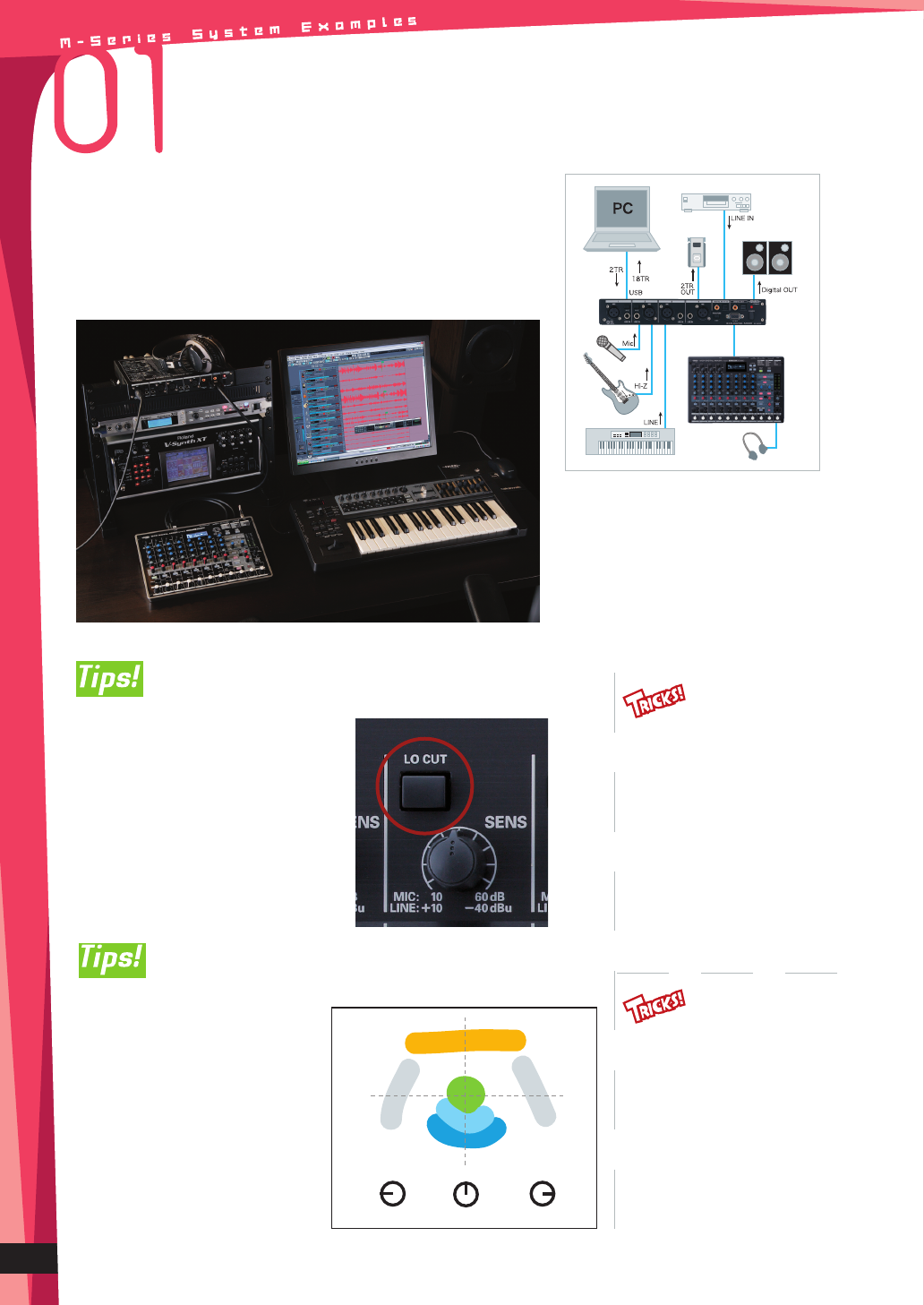
There are many sources of noise
when recording at home, such as
the refrigerator and air conditioner,
or vibrations from passing vehicles.
Normally we don’t pay attention to these
sounds, but when recording, they can be
a major factor that impairs the clarity of
the recorded sound. If the sound from
a mic is lacking in clarity, try turning
on the LO CUT switches provided on
channels 1—4. This is also a useful
thing to do if the vibrations from your
foot tapping the rhythm on the floor
are being transmitted through the mic
stand and are getting recorded.
By combining the M-16DX with a DAW recording system,
you’ll be able to play back backing tracks created on
your PC while recording your vocals or instrumental
performance directly to the PC. Alternatively, you could
back up your performance with sound from a karaoke
CD, a rhythm machine, or a backing performance of
drums that you recorded in stereo at an outside studio.
The final sound processed by the Finalize function can
be recorded to your PC, or you can use DAW software
such as SONAR to perform multitrack recording of up to
eighteen tracks (16 channels + two master channels).
Cutting household
noise when you
record with a mic!
Keyboard
L
PAN PAN PAN
R
Bass
Drum
GtGt
Vo
Channels 1/2 let you apply a dedicated
insert effect specifically designed
for vocals and narration. “POWER
COMP1–3” will apply the character of a
vacuum tube amp used in professional
recordings, giving your vocal greater
presence. “VOCAL ENHANCER” will
enhance the character of your voice,
and you can use “NARRATION” to
minimize unwanted sibilants (excessive
“s” sounds) when recording spoken
lines or narrations.
Take advantage of
the vocal effects!
The M-series is the ideal choice for home studio recording using DAW
software such as SONAR. In particular, the M-16DX has a separate I/O
module and Mix controller, making it easy to reconnect your mic or
instrument cables during the multi-track recording process, and letting
you operate the Mix controller on an uncluttered desktop. Since there
are Hi-Z jacks for connecting your guitar/bass, you can record your
guitar at home via a direct line connection until you’re satisfied.
To improve the clarity of each part,
it’s important to use EQ boost and cut
in appropriate ways. If you want to
improve the definition of a vocal, you
can give the voice more body by using
the MID EQ to apply a wide (low Q)
boost at 1 kHz, while cutting the sound
below 100 Hz to eliminate muddiness.
On the channels for guitar, bass, and
snare, cut the frequency ranges that
would conflict with each other so
that the most important element of
each instrument is emphasized, thus
ensuring that there is good separation
between the sounds.
Use EQ to eliminate
“mushy” sound!
Audio
recorder
Audio player
Digital powered
monitor speakers
Headphones
Multitrack recording using your PC
Home recording system
When recording a vocal, you will find
it much easier to sing if there’s just a
bit of echo/reverb (FX) on your voice.
However, recording the sound without
the effect applied will make it easier at
later stages of the mixing process. Turn
the headphone/control room FX switch
on. This will allow the unprocessed
sound to be sent from the main out for
recording while you apply echo/reverb
just to the headphones for monitoring
as you record.
Apply reverb only
to the monitor
sound!
* The I/O Module is rack-mountable. Rack-mount adaptor is included in the M-16DX package.
10


















